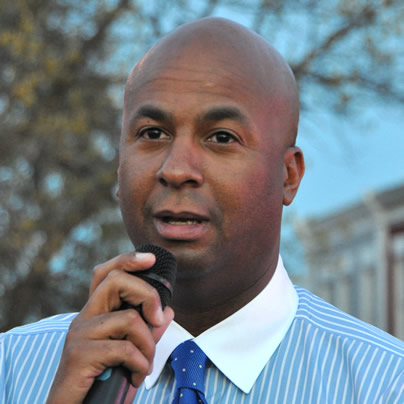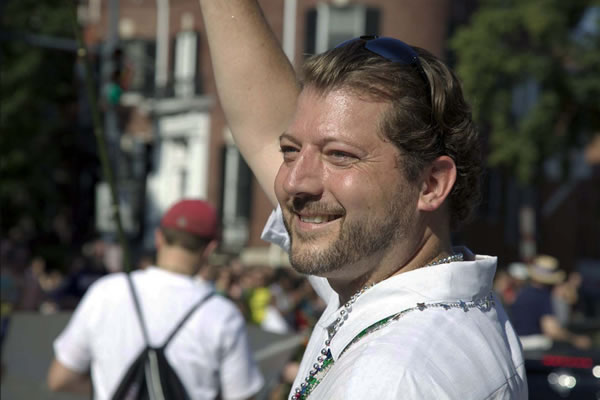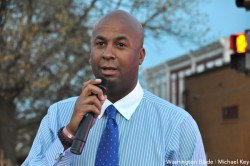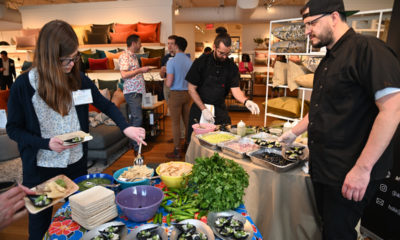Local
Grosso beats Brown in ‘gay’ precincts
Both candidates strong supporters of LGBT rights


David Grosso accomplished a rare feat in D.C. politics by unseating an incumbent last week. (Photo courtesy of Grosso for Council 2012)
Independent D.C. Council candidate David Grosso beat incumbent Council member Michael Brown (I-At-Large) on Nov. 6 in 15 out of 16 voter precincts with large numbers of LGBT residents.
According to final but unofficial returns from the D.C. Board of Elections, Grosso finished ahead of Brown in the so-called “gay” precincts by a significantly greater margin than Grosso bested Brown in the citywide vote.
Grosso surprised many political observers by accomplishing a rare feat in D.C. politics — unseating an incumbent Council member.
In the citywide vote, Grosso came in second place in a seven-candidate race with two at-large seats in play. Under the city’s election law, a Democratic candidate is eligible for only one of the seats.
Incumbent Democrat Vincent Orange won re-election by finishing first with 37.4 percent of the vote. Grosso finished second, with 20.8 percent, making him the winner of the second of the two seats. Brown came in third place, with 15.3 percent of the vote.
However, in 11 of the 16 precincts with high concentrations of LGBT voters Grosso came in first place. He finished second in another four of the “gay” precincts.
Brown came in second place in just one of the precincts with high concentrations of LGBT residents – Precinct 112, which is located in Anacostia.
Brown finished in sixth place in six of the precincts and finished third or lower in the remaining four.
In the citywide tally, Republican Mary Brooks Beatty finished fourth with 7 percent of the vote, independent candidates A.J. Cooper and Leon Swain tied for fifth place with each getting 6.6 percent, and Statehood Green Party candidate Ann Wilcox came in last place with 5.8 percent.
Although political insiders acknowledged that Brown was hurt by the latest in a series of personal financial problems, most pundits expected the otherwise popular Council member to survive his re-election bid.
Brown has been a longtime strong supporter of LGBT rights, voting for virtually every LGBT supportive bill or amendment, including the city’s same-sex marriage bill that has come before the Council during his close to four-year tenure as a Council member.
Grosso has worked for pro-gay former Council member Sharon Ambrose (D-Ward 6) and for pro-gay Del. Eleanor Holmes Norton (D-D.C.). He has expressed support for LGBT issues during the campaign. He and Brown also campaigned aggressively in the LGBT community.
Nearly all of the precincts with a high concentration of visible LGBT residents are in majority white sections of the city. Most of the majority white areas voted for Grosso and most of the majority black sections of the city voted for Brown and Orange over Grosso.
D.C. political consultant Chuck Theis, who has been a longtime observer of D.C. elections, said the parts of the city where Grosso finished ahead of Brown, including the gay precincts, are made up largely of liberal-progressive whites who voted overwhelmingly for President Obama’s re-election. Theis said these voters, who supported Brown four years ago, appear to have lost confidence in him due to the widely publicized reports of Brown’s financial problems, including Brown’s disclosure earlier this year that more than $100,000 in campaign funds were stolen by his campaign treasurer. The treasurer denied stealing the funds.
Most of the majority black sections of the city, especially in Wards 7 and 8, appear to have had less of a problem with Brown’s financial issues and view him as a strong supporter of the issues they deem important, such as affordable housing and efforts to curtail the high unemployment rate in the two wards.
“Michael Brown stepped into a perfect storm,” Theis told the Blade. “He had almost no money due to his missing campaign funds, and the missing funds became a scandal. This raised the issue of all his past financial problems.”
The unexpectedly strong campaign waged by Grosso, who attacked Brown on his financial problems, and the unusual at-large election system, in which voters are asked to select two candidates but close to half the voters select just one (the Democrat) – appear to have created an insurmountable problem for Brown, Theis said.
Following is a list of the 16 precincts with large concentrations of LGBT residents and the vote count, by percentage, as reported by the D.C. Board of Elections:
- Precinct 14 (Dupont Circle): Grosso, 30.2; Orange, 23.5; Brown, 5.6
- Precinct 15 (Dupont Circle): Grosso, 30.5; Orange, 21.9; Brown, 6.3
- Precinct 16 (Logan Circle): Grosso, 30.8; Orange, 25.0; Brown, 8.9
- Precinct 17 (Logan Circle): Orange, 28.8; Grosso, 26.5; Brown, 11.1
- Precinct 141 (Logan Circle): Grosso, 29.4; Orange 24.3; Brown, 8.6
- Precinct 22 (14th and U Street, N.W. area): Grosso, 29.4; Orange, 24.9; Brown, 10.2
- Precinct 23 (Columbia Heights): Orange, 35.1; Grosso, 21.3; Brown, 13.1
- Precinct 24 (Adams Morgan): Grosso, 30.1; Orange, 26.5; Brown, 9.9
- Precinct 25 (Adams Morgan): Grosso, 33.1; Orange, 19.8; Brown, 8.8
- Precinct 39 (Mt. Pleasant): Grosso, 30.8; Orange, 26.2; Brown, 11.3
- Precinct 40 (Mt. Pleasant): Grosso, 33.4; Orange, 22.3; Brown, 9.1
- Precinct 89 (Capitol Hill): Grosso, 41.3; Mary Brooks Beatty, 16.2; Orange, 13.7; Brown, 5.5
- Precinct 90 (Capitol Hill): Grosso, 36.2; Orange 18.2; Brown, 5.0
- Precinct 112 (Anacostia): Orange, 58.2; Brown, 23.8; Grosso, 4.8
- Precinct 127 (Southwest Waterfront): Orange, 37.8; Grosso, 18.7; Brown, 16.4
District of Columbia
Bowser budget proposal calls for $5.25 million for 2025 World Pride
AIDS office among agencies facing cuts due to revenue shortfall

D.C. Mayor Muriel Bowser’s proposed fiscal year 2025 budget includes a request for $5.25 million in funding to support the June 2025 World Pride celebration, which D.C. will host, and which is expected to bring three million or more visitors to the city.
The mayor’s proposed budget, which she presented to the D.C. Council for approval earlier this month, also calls for a 7.6 percent increase in funding for the Mayor’s Office of LGBTQ Affairs, which amounts to an increase of $132,000 and would bring the office’s total funding to $1.7 million. The office, among other things, provides grants to local organizations that provide services to the LGBTQ community.
Among the other LGBTQ-related funding requests in the mayor’s proposed budget is a call to continue the annual funding of $600,000 to provide workforce development services for transgender and gender non-conforming city residents “experiencing homelessness and housing instability.” The budget proposal also calls for a separate allocation of $600,000 in new funding to support a new Advanced Technical Center at the Whitman-Walker Health’s Max Robinson Center in Ward 8.
Among the city agencies facing funding cuts under the mayor’s proposed budget is the HIV/AIDS, Hepatitis, Sexually Transmitted Disease, and Tuberculosis Administration, known as HAHSTA, which is an arm of the D.C. Department of Health. LGBTQ and AIDS activists have said HAHSTA plays an important role in the city’s HIV prevention and support services. Observers familiar with the agency have said it recently lost federal funding, which the city would have to decide whether to replace.
“We weren’t able to cover the loss of federal funds for HAHSTA with local funds,” Japer Bowles, director of the Mayor’s Office of LGBTQ Affairs, told the Washington Blade. “But we are working with partners to identify resources to fill those funding gaps,” Bowles said.
The total proposed budget of $21 billion that Bowser submitted to the D.C. Council includes about $500 million in proposed cuts in various city programs that the mayor said was needed to offset a projected $700 million loss in revenue due, among other things, to an end in pandemic era federal funding and commercial office vacancies also brought about by the post pandemic commercial property and office changes.
Bowser’s budget proposal also includes some tax increases limited to sales and business-related taxes, including an additional fee on hotel bookings to offset the expected revenue losses. The mayor said she chose not to propose an increase in income tax or property taxes.
Earlier this year, the D.C. LGBTQ+ Budget Coalition, which consists of several local LGBTQ advocacy organizations, submitted its own fiscal year 2025 budget proposal to both Bowser and the D.C. Council. In a 14-page letter the coalition outlined in detail a wide range of funding proposals, including housing support for LGBTQ youth and LGBTQ seniors; support for LGBTQ youth homeless services; workforce and employment services for transgender and gender non-conforming residents; and harm reduction centers to address the rise in drug overdose deaths.
Another one of the coalition’s proposals is $1.5 million in city funding for the completion of the D.C. Center for the LGBTQ Community’s new building, a former warehouse building in the city’s Shaw neighborhood that is undergoing a build out and renovation to accommodate the LGBTQ Center’s plans to move in later this year. The coalition’s budget proposal also calls for an additional $300,000 in “recurring” city funding for the LGBTQ Center in subsequent years “to support ongoing operational costs and programmatic initiatives.”
Bowles noted that Bowser authorized and approved a $1 million grant for the LGBTQ Center’s new building last year but was unable to provide additional funding requested by the budget coalition for the LGBTQ Center for fiscal year 2025.
“We’re still in this with them,” Bowles said. “We’re still looking and working with them to identify funding.”
The total amount of funding that the LGBTQ+ Budget Coalition listed in its letter to the mayor and Council associated with its requests for specific LGBTQ programs comes to $43.1 million.
Heidi Ellis, who serves as coordinator of the coalition, said the coalition succeeded in getting some of its proposals included in the mayor’s budget but couldn’t immediately provide specific amounts.
“There are a couple of areas I would argue we had wins,” Ellis told the Blade. “We were able to maintain funding across different housing services, specifically around youth services that affect folks like SMYAL and Wanda Alston.” She was referring to the LGBTQ youth services group SMYAL and the LGBTQ organization Wanda Alston Foundation, which provides housing for homeless LGBTQ youth.
“We were also able to secure funding for the transgender, gender non-conforming workforce program,” she said. “We also had funding for migrant services that we’ve been advocating for and some wins on language access,” said Ellis, referring to programs assisting LGBTQ people and others who are immigrants and aren’t fluent in speaking English.
Ellis said that although the coalition’s letter sent to the mayor and Council had funding proposals that totaled $43.1 million, she said the coalition used those numbers as examples for programs and policies that it believes would be highly beneficial to those in the LGBTQ community in need.
“I would say to distill it down to just we ask for $43 million or whatever, that’s not an accurate picture of what we’re asking for,” she said. “We’re asking for major investments around a few areas – housing, healthcare, language access. And for capital investments to make sure the D.C. Center can open,” she said. “It’s not like a narrative about the dollar amounts. It’s more like where we’re trying to go.”
The Blade couldn’t’ immediately determine how much of the coalition’s funding proposals are included in the Bowser budget. The mayor’s press secretary, Daniel Gleick, told the Blade in an email that those funding levels may not have been determined by city agencies.
“As for specific funding levels for programs that may impact the LGBTQ community, such as individual health programs through the Department of Health, it is too soon in the budget process to determine potential adjustments on individual programs run though city agencies,” Gleick said.
But Bowles said several of the programs funded in the mayor’s budget proposal that are not LGBTQ specific will be supportive of LGBTQ programs. Among them, he said, is the budget’s proposal for an increase of $350,000 in funding for senior villages operated by local nonprofit organizations that help support seniors. Asked if that type of program could help LGBTQ seniors, Bowles said, “Absolutely – that’s definitely a vehicle for LGBTQ senior services.”
He said among the programs the increased funding for the mayor’s LGBTQ Affairs office will support is its ongoing cultural competency training for D.C. government employees. He said he and other office staff members conduct the trainings about LGBTQ-related issues at city departments and agencies.
Bowser herself suggested during an April 19 press conference that local businesses, including LGBTQ businesses and organizations, could benefit from a newly launched city “Pop-Up Permit Program” that greatly shortens the time it takes to open a business in vacant storefront buildings in the downtown area.
Bowser and Nina Albert, D.C. Deputy Mayor for Planning and Economic Development, suggested the new expedited city program for approving permits to open shops and small businesses in vacant storefront spaces could come into play next year when D.C. hosts World Pride, one of the word’s largest LGBTQ events.
“While we know that all special events are important, there is an especially big one coming to Washington, D.C. next year,” Bowser said at the press conference. “And to that point, we proposed a $5.25 million investment to support World Pride 2025,” she said, adding, “It’s going to be pretty great. And so, we’re already thinking about how we can include D.C. entrepreneurs, how we’re going to include artists, how we’re going to celebrate across all eight wards of our city as well,” she said.
Among those attending the press conference were officials of D.C.’s Capital Pride Alliance, which will play a lead role in organizing World Pride 2025 events.
Maryland
Health care for Marylanders with HIV is facing huge cuts this summer
Providers poised to lose three-quarters of funding

BY MEREDITH COHN | By the end of June, health care providers in Maryland will lose nearly three-quarters of the funding they use to find and treat thousands of people with HIV.
Advocates and providers say they had been warned there would be less money by the Maryland Department of Health, but were stunned at the size of the drop — from about $17.9 million this fiscal year to $5.3 million the next. The deep cuts are less than three months away.
The rest of this article can be read on the Baltimore Banner’s website.
District of Columbia
Taste of Point returns at critical time for queer students
BIPOC scholar to speak at Room & Board event on May 2

The Point Foundation will kick off May with its annual Taste of Point DC event. The event will be hosted at Room & Board on 14th Street and feature a silent auction, food tastings, a speech from a scholar, and more.
Point’s chief of staff, Kevin Wright, said that at Taste of Point, the scholars are the star of the show.
“People never come to an event to hear Point staff speak, they come to hear from the people most impacted by the program,” he said. “At its core Taste of Point is designed to center and highlight our scholars’ voices and experiences.”
This year, a Point BIPOC Scholar, Katherine Guerrero Rivera will speak at the event.
“It is a great opportunity to highlight the scholars out there on the front lines making impacts in almost every sector and job field,” Wright said.
Wright pointed out that this year especially is a pivotal time for LGBTQ students.
“In 2023, there were 20 states that passed anti-LGBTQ legislation,” he said. “By this point in [2024] we already have more.”
Wright said the impacts of those legislative attacks are far reaching and that Point is continuously monitoring the impact they have on students on the ground.
Last month, The Washington Post reported that states with anti-LGBTQ laws in place saw school hate crimes quadruple. This report came a month after a non-binary student, Nex Bennedict, died after being attacked at school.
“So, we see this as a critical moment to really step up and help students who are facing these challenges on their campus,” Wright said. “Our mission is to continue to empower our scholars to achieve their full academic and leadership potential.”
This year Point awarded nearly 600 LGBTQ students with scholarships. These include the flagship scholarship, community college scholarship and the BIPOC scholarship. When the foundation started in 2002, there were only eight scholarships awarded.
Dr. Harjant Gill is one of those scholars who said the scholarship was pivotal for him. Gill said he spent his undergraduate years creating films and doing activism for the LGBTQ community.
As a result, his academic record wasn’t stellar and although he was admitted into American University’s graduate program he had no clue how he would fund it.
Upon arrival to American he was told to apply for a Point scholarship and the rest was history.
“It ended up being the one thing that kept me going otherwise I would have dropped out,” he said. “Point was incredibly instrumental in my journey to becoming an academic and a professor.”
More than a decade later, Gill serves on the host committee for Taste of Point and is a mentor to young Point scholars. He said that he donates money yearly to Point and that when he is asked what he wants for a gift he will often tell his friends to donate too.
To attend the event on Wednesday, May 2, purchase tickets at the Point website. If you can’t attend this year’s Taste of Point DC event but would like to get involved, you can also donate online.




















